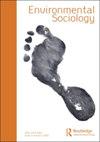影响因子:
2.8
ISSN:
print: 2325-1042
研究领域:
ENVIRONMENTAL STUDIES
自引率:
12.00%
Gold OA文章占比:
20.00%
原创研究文献占比:
94.74%
SCI收录类型:
Emerging Sources Citation Index (ESCI) || Scopus (CiteScore)
期刊介绍英文:
Environmental Sociology is dedicated to applying and advancing the sociological imagination in relation to a wide variety of environmental challenges, controversies and issues, at every level from the global to local, from ‘world culture’ to diverse local perspectives. As an international, peer-reviewed scholarly journal, Environmental Sociology aims to stretch the conceptual and theoretical boundaries of both environmental and mainstream sociology, to highlight the relevance of sociological research for environmental policy and management, to disseminate the results of sociological research, and to engage in productive dialogue and debate with other disciplines in the social, natural and ecological sciences. Contributions may utilize a variety of theoretical orientations including, but not restricted to: critical theory, cultural sociology, ecofeminism, ecological modernization, environmental justice, organizational sociology, political ecology, political economy, post-colonial studies, risk theory, social psychology, science and technology studies, globalization, world-systems analysis, and so on. Cross- and transdisciplinary contributions are welcome where they demonstrate a novel attempt to understand social-ecological relationships in a manner that engages with the core concerns of sociology in social relationships, institutions, practices and processes. All methodological approaches in the environmental social sciences – qualitative, quantitative, integrative, spatial, policy analysis, etc. – are welcomed. Environmental Sociology welcomes high-quality submissions from scholars around the world.
CiteScore:
| CiteScore | SJR | SNIP | CiteScore排名 |
|---|---|---|---|
| 4.6 | 0.881 | 1.079 | 学科 排名 百分位 大类:Social Sciences 小类:Sociology and Political Science 226 / 1466 84% 大类:Social Sciences 小类:Geography, Planning and Development 194 / 821 76% 大类:Environmental Science 小类:Ecology 120 / 461 74% 大类:Environmental Science 小类:Management, Monitoring, Policy and Law 148 / 399 63% |
发文信息
中科院SCI期刊分区
2025年3月20日发布
| 大类 | 小类 | TOP期刊 | 综述期刊 |
|---|---|---|---|
| 3区 社会学 | 3区 环境研究 ENVIRONMENTAL STUDIES | 否 | 否 |
WOS期刊分区
| 学科分类 |
|---|
Q3ENVIRONMENTAL STUDIES |
历年影响因子
| 2022年 | 2.5000 |
|---|---|
| 2023年 | 2.4000 |
| 2024年 | 2.8000 |
历年发表
| 2015年 | 33 |
|---|---|
| 2016年 | 48 |
| 2017年 | 41 |
| 2018年 | 39 |
| 2019年 | 33 |
| 2020年 | 33 |
| 2021年 | 39 |
| 2022年 | 34 |
投稿信息
出版国家(地区):
United Kingdom
出版商:
Taylor & Francis
Environmental Sociology - 最新文献
Human-animal connections: expanding and cross-worlding relational approaches to resilience
Pub Date : 2023-12-21 DOI: 10.1080/23251042.2023.2295098 Janine Natalya ClarkAir quality sensors and distributional environmental justice: a case study of Salt Lake County, Utah
Pub Date : 2023-12-18 DOI: 10.1080/23251042.2023.2295099 Casey J. Mullen, S. Grineski, T. W. Collins, Aaron B. FloresUrban green governance and mechanisms of generation of ecosystem services: Milan’s green governance models
Pub Date : 2023-11-09 DOI: 10.1080/23251042.2023.2277972 Oscar Luigi Azzimonti
免责声明:
本页显示期刊或杂志信息,仅供参考学习,不是任何期刊杂志官网,不涉及出版事务,特此申明。如需出版一切事务需要用户自己向出版商联系核实。若本页展示内容有任何问题,请联系我们,邮箱:info@booksci.cn,我们会认真核实处理。
本页显示期刊或杂志信息,仅供参考学习,不是任何期刊杂志官网,不涉及出版事务,特此申明。如需出版一切事务需要用户自己向出版商联系核实。若本页展示内容有任何问题,请联系我们,邮箱:info@booksci.cn,我们会认真核实处理。





